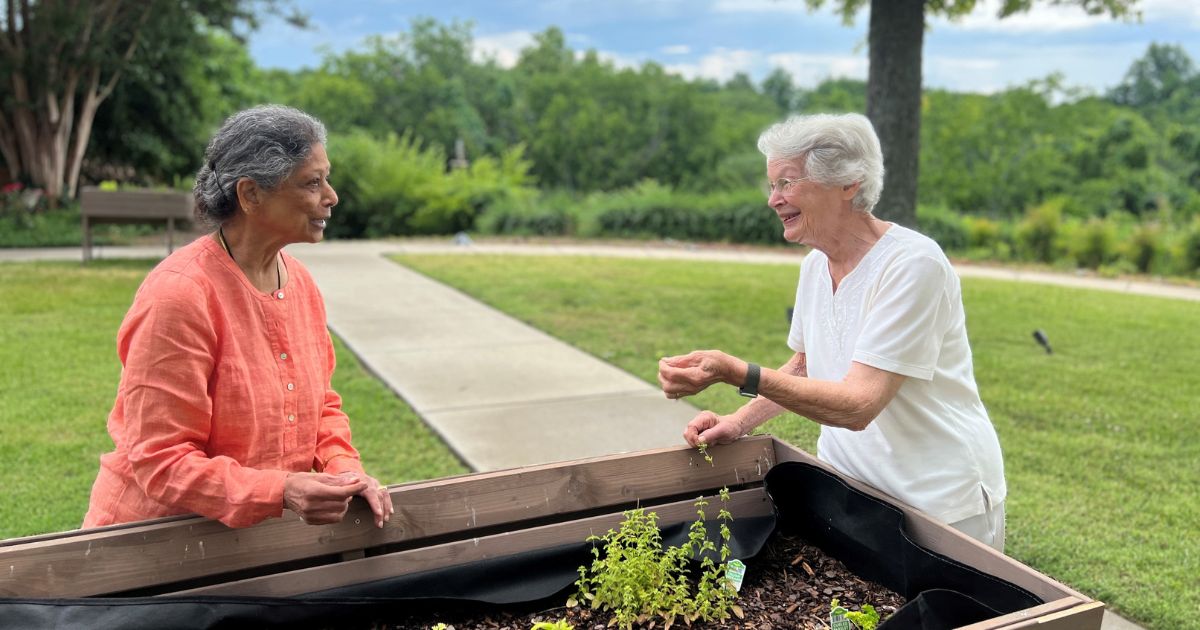Caring for an aging loved one can be a rewarding experience, but it also comes with challenges that can lead to sleepless nights, anxiety, exhaustion, and even burnout. Many family caregivers feel isolated, believing they must manage everything on their own and that their loved one relies completely on them.
Fortunately, memory support day programs can provide a beneficial solution for both caregivers and older adults. This blog from Abe’s Garden Community breaks down the advantages these programs provide to seniors and their families.
Why Respite Is Essential for Family Caregivers
Family caregivers may endure high levels of stress, which can lead to depression and health problems. Many caregivers sacrifice aspects of their own lives, such as a career, relationships, and personal well-being, to provide care for a loved one.
Taking a break from caregiving isn’t selfish – it’s essential. You must put on your own oxygen mask before helping others, and caring for yourself allows you to provide better care for your loved one.
Respite care benefits everyone involved, including:
- Caregivers – reduced stress, improved physical health, maintained relationships, and preserved mental well-being
- Older adults – new activities, social interaction, and professional care techniques
- Families – stronger relationships and more sustainable care arrangements
How Memory Support Day Programs Provide Respite Care for Family Caregivers
Memory support day programs, also known as Adult day programs, provide a comprehensive care environment for seniors who may require supportive care and supervision during weekday daytime hours. Trained professionals facilitate quality programs and ensure a safe, engaging environment for older adults to thrive, allowing family caregivers the respite they need.
Memory support day programs offer seniors:
- Specially trained staff who understands dementia care, behavior management, and safety protocols
- Structured, therapeutic environment designed to maintain cognitive function and encourage social interaction
- Comprehensive communication with families, such as updates on daily activities, mood changes, and any concerns
They also offer family caregivers time to:
- Maintain their health by exercising, resting, and going to medical appointments
- Preserve relationships by spending time with friends and family
- Handle everyday responsibilities like running errands, managing finances, and household chores
- Pursue personal interests such as hobbies, volunteer work, or other activities they enjoy
- Work if needed to maintain employment or pursue other career opportunities
Explore the benefits of Abe’s Garden Club >>
Starting Your Journey to Respite
If you’re hesitant about trying an memory support day program, remember that many programs offer trial days or gradual introductions to help older adults acclimate to the new environment. You may choose to start with a few hours once a week and build up the hours as your loved one feels comfortable.
When you take care of yourself, you’re helping your loved one as well. Carving out time for respite means returning to your caregiving role refreshed and more patient. You’ll likely experience improved mood and more energy, and your relationships with others will improve too.
Are You Ready to Explore Memory Support Day Programs?
Download our free guide to help you understand the options available to you and your loved one. You’ll learn about our approach at Abe’s Garden Club, the benefits of adult day programs, and whether our program is a good fit for your loved one.

